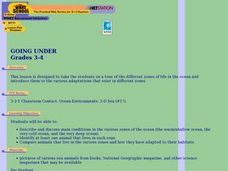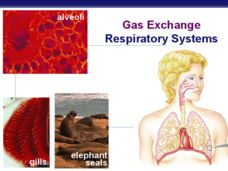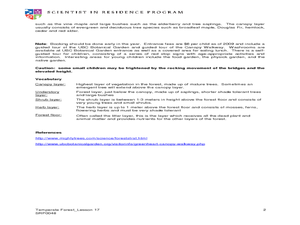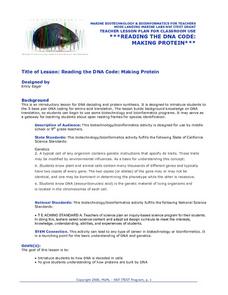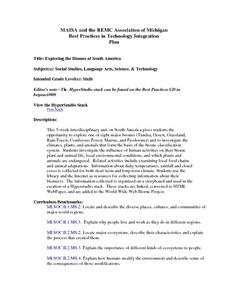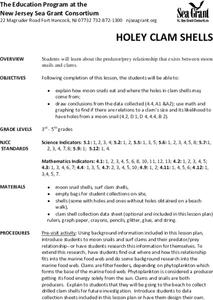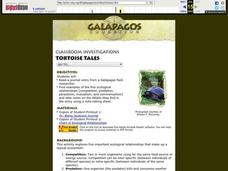Curated OER
Critters of the Water
Middle schoolers examine different organisms in various marine habitats. They identify any adaptations that have allowed the organisms to survive. They develop an imaginary organism and describe its life cycle.
Curated OER
Ocean Expedition with Jacques Cousteau
Learners role play that they are on an ocean voyage with Jacques Cousteau as they study plant, and animal species and adaptation. They write a five page journal, create artwork of the expedition.
Curated OER
Design a Deep- Sea Vertebrate or Invertebrate
Students design a deep-sea animal. In this research based instructional activity, students research and design a vertebrate or invertebrate that lives in a methane hydrate habitat. They compile a class chart of the adaptations animals...
Curated OER
Learning About Animals' Bodies
Students research different animals (mammals, reptiles, amphibians, insects, birds, fish) and create books, murals, dioramas, puppets, and sculptures to illustrate the necessity of various body parts for overall survival. In this animal...
Curated OER
Learning About Mammals
Students study the mammal classification and forms of them living in the United States. For this mammal study lesson, students read through orders of mammals that exist in the United States. Students also study the taxonomy of an eastern...
Curated OER
Food for Thought
Students understand the importance of each member of a food chain through a game. In this food chains lesson, students receive background information and then play a game to simulate what happens in the food chain of an endangered...
Curated OER
Explorations Through Time
In this earth history worksheet, students visit a website and complete 15 fill in the blank and 8 short answer questions based on what they read. Topics include biodiversity, animal kingdoms, evolution, fossils, and extinction.
Curated OER
Gas exchange: Respiratory Systems
The need for a respiratory system in humans versus being reliant on gas exchange structures is demonstrated. There are many details about the advantages and disadvantages of each mechanism. Students are able to learn about the...
Curated OER
Tree Top Canopy Field Trip
Students visit the Greenheart Canopy Walkway. In this environmental instructional activity, students experience a coastal rain forest ecosystem. Students interact and explore the different layers of the rain forest.
Curated OER
Reading the Dna Code: Making Protein
Students study DNA decoding and protein synthesis. They use the amino acid table to translate DNA, break DNA strands into three nucleotide codes, and translate nucleotides into amino acid protein codes. They research the importance of...
Curated OER
Exploring the Biomes of South America
Sixth graders complete a five-week unit investigating the eight major biomes of South America. They conduct Internet research, collect short-term and long-term climate data, and create a HyperStudio slideshow stack about a selected biome...
Curated OER
Venom!
Students examine the nature of venom. They conduct an experiment to demonstrate how proteins such as venoms can be denatured using raw eggs, beakers, heated water, and compresses.
Curated OER
Holey Clamshells
Students analyze data to make hypotheses and conclusions regarding the predator/prey relationship between moon snail and surf clams.
Curated OER
Who's New in the Deep Sea?
Students examine the methods and technology that scientists use to study the deep sea and other remote environments. In this ocean habitats lesson students make observations about organisms from video clips, generate questions and...
Curated OER
Tortoise Tales
Students read journal entry from a Gal??pagos field researcher, find examples of five ecological relationships (competition, predation, parasitism, mutualism, and commensalism) and take notes on the details they find in the entry using a...
Curated OER
Quiz
In this quiz worksheet, students, after researching and discussing different types of world-wide animals, determine the answers to ten key true and false questions.
Curated OER
Water Quality Monitoring
Students comprehend the four parameters of water quality. They perform tests for salinity, dissolved oxygen, pH and clarity or turbidity. Students comprehend why scientists and environmental managers monitor water uality and aquatic...
Curated OER
Loggerhead Nest Management Program
Students identify the sea turtle management documentary and complete an activity for each slide. They plot the location of nests laid on the island they patrol and discuss their rationale for management decisions. Finally, students...
Curated OER
Drawing -Scratchboard
Students choose subject of composition and do sketches in computer lab of flora and fauna contained within their environment.
Curated OER
Adventuring in the Archipelago
Students study Charles Darwin's voyage on the HMS Beagle and his visit to the Gal??pagos Islands. They click through an interactive map of the Gal??pagos Islands to read actual and fictional journal entries from a fellow eco-tourist.
Curated OER
CSI Clamshell Investigation
Students explore predator/prey relationships. They research information on moon snails and claims. Students draw conclusions from the data collected. They use math and graphing to determine if there is a relationship to the clam's size...
Curated OER
Sharkland Wiki
Students, while researching the waters around southern Africa and viewing a video of the episode "Sharkland" from Thirteen's series NATURE, critique reliability of online resources and analyze the various components of a wiki. They...
Georgia Department of Education
Ga Virtual Learning: Marine Invertebrates
Students learn about invertebrates found in the ocean, their individual methods of adaptations, identifying characteristics, and contributions to the marine ecosystem.







